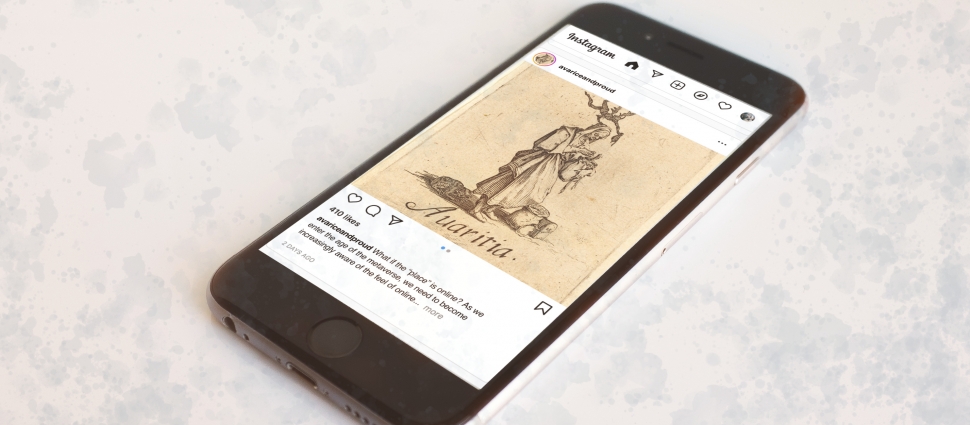Social Media Is a Neighborhood Built on Coveting

Every place has a feel, an impression or characteristic sensation. Home has a feel, even if it isn’t always positive. The neighborhood you grew up in has a feel. The noisy main street of your urban center has perhaps a collection of feels depending on the hour or day. Then there’s the shaded path in a wooded park, the nearby field after a fresh rain, or the indie coffee shop on the corner. You get the idea.
What if the “place” is online? As we enter the age of the metaverse, we need to become increasingly aware of the feel of online spaces. Social media websites are like miniature (or not so miniature) cities, each with a certain feel. And in two of the largest online cities, Facebook and Instagram, the dominant feel is one of covetousness — which, as Paul clarifies in Eph. 5:5 and Col. 3:5, is fundamentally an issue of idolatry.
Christians at times draw overly-direct lines from ancient pagan idolatry to contemporary practices. Such connections, if they exist, are seldom as straightforward as we might pretend. It would be distorted to claim that participation in social media is equivalent to participation in pagan temple worship. Viewing your friend’s story on Instagram is not ipso facto a breach of the Tenth Commandment. Scrolling through social media is therefore more like taking a tour of Beverly Hills, the Upper East Side of Manhattan, or the White House. Each of these locations unavoidably leaves an impression on those who visit it. You may not get sucked in or succumb to the atmosphere, but you will almost certainly be affected by it.
This is part of the age-old conundrum of how to be in the world, but not of it. That will mean different things for different people. None of the above physical locations are bad. The people who live in those places are not bad people (that is, not any worse than the rest of us). Likewise, most of the pathways, houses, and neighborhoods of social media are not bad places to visit, hang around, or work in. These places are part of a world that God has made and designed.
However, like any part of the world, it’s important that we go with our eyes open. It’s important that we seek to understand what is the spirit of a place? What are its values? When it comes to social media, the chief value is coveting. The cry rings out from every side: “Come here to covet, and to be coveted! Get the latest, get the greatest! Or be the greatest and the latest!” One of the fascinating developments within the social media world is that it has morphed into a true marketplace. Friends, strangers, businesses, comedians, educators, politicians – all of them are vying for your attention.
Just like marketplaces of old, it is rare (not impossible) that you will walk through it and come away feeling better about yourself. How often do you come up for air out of social media, and feel more satisfied about life, more content with yourself? How often do you feel that you’ve touched, or been reminded of more of the good that’s in God’s world? Not impossible, but not easy. Social media offers a heightened degree of image and identity curating. It enables, and even invites us, to walk a few steps further down the road of imagining ourselves as celebrities and public figures. And what is the currency of a celebrity? Likability. You half covet her life, half covet a closer connection to her, which makes you feel better by association. That is the feel of social media. That is the engine driving the cycle between producers and consumers.
Besides taking warning, or besides quitting cold turkey, what can we do? Is there any way to visit, let alone live and work in these places without being dragged down? Since I’ve personally opted to steer clear for the most part, I’m no expert, but here are two thoughts.
1) Know your entrance and your exit. Are you dipping into social media to kill some time while you wait? Fine. When the wait is over, that’s your exit. Did you get on your phone to answer a text or to have some me-time? Know when you are entering the digital world, so you can avoid the unwitting wandering that leaves your whole trip tinged with regret. We can’t do this perfectly, but being aware of entrances and exits will heighten your sense of intentionality.
2) Make it personal. Reach out to someone, personally. Connect with a real human. Text someone afterward. Respond with something longer than an emoji or a thumbs up. Although this was one of the initial cornerstones of social media, this personal aspect has fallen by the wayside, and understandably so. Instead of cementing friendships, we follow and are followed. The system is designed that way.
Social media is more formative than a marketplace or a neighborhood because it has its own mission. It’s as if an entire neighborhood was a for-profit business. It is definitely not neutral. Meta isn’t being financially sustained by you wishing your Aunt Carol a happy birthday, even though that’s where relational life is being nurtured. Meta is sustained through paid content. Does that mean we should flee the corridors of Facebook and Twitter? Certainly not. But it does mean we will need to fight to keep it personal.
Read previous articles in this series here.
Justin Poythress (MDiv, WTS) is Pastor of All Saints Presbyterian Church in Boise, ID. He blogs regularly at Time & Chance.
Related Links
Podcast: "The Metaverse Church"
"Envy in the Digital Age" by Brad Littlejohn
"Sodom's Great Sin?" by Aaron Denlinger
The Envy of Eve by Melissa Kruger
God, Technology, and the Christian Life by Tony Reinke




